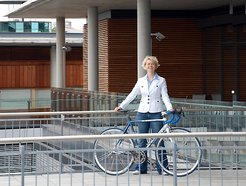Here, music speaks for itself!
Daniela Sammler is a researcher at the Max Planck Institute for Cognition and Neurosciences in Leipzig, where she is investigating the areas of the brain that host cognitive processes such as language and music, and how they functionally complement each other.

Ms Sammler, your office looks like a congress poster session. Do you collect your posters as souvenirs?
Sammler (laughing): No, not as souvenirs – if that were the case, I would have had to move to a bigger office a long time ago! Posters, like those hanging here, help me when writing my papers: They bring back memories and are a source of inspiration. Then, when the paper is finished, the posters are sent to the archive – and replaced by new ones on the wall.
A trick used by an expert, so to speak. How does one become a neuropsychologist?
Sammler: I was interested in psychology from a very early age, and it was always my goal to study psychology at university: the Alma mater Lipsiensis, the University of Leipzig. It was here that Wilhelm Wundt built the first laboratory for experimental psychology in 1879. During my studies, I spent a year at the Louis Pasteur University in Strasbourg – where Professor Liliane Manning introduced me to the fascinating world of neuropsychology. When I returned to the University of Leipzig, I knew without the shadow of a doubt, that my future lay in the cognitive and clinical field, and that I wanted to learn to understand the workings of the human brain. Yes, though I was still very young, even then my heart was set on pursuing neuropsychology as my future career. And this is still the case.
You went on to work with Angela D. Friederici and Stefan Kölsch, two international experts in cognitive linguistics and musicology. Did you come up with your present research topic straight away?
Sammler: It all came about very quickly. I had already learned a lot about cognition and EEG at university from Erich Schröger, and I had the chance during an internship to combine this with research on music and language. This also provided me with the opportunity to write my dissertation within the framework of the Max Planck research group “Neurocognition in music”. This was a unique opportunity. Over the course of my work, I carried out investigations into whether language and music – particularly the grammar of both – are processed in similar, perhaps even overlapping, brain structures. To this end, I worked with epilepsy patients at the university clinics in Bonn and Freiburg im Breisgau, work which involved implanting electrodes in the brain to identify epileptic tissue. A diagnostically and scientifically important side-effect of these electrodes is that brain functions surrounding the defective tissue can also be identified, and therefore also the processing of language and music. Through this work, I discovered that there was an overlapping in the processing of language and musical grammar – not 100%, but enough to be of significance.
You’ve now won the Otto Hahn Medal for your doctoral research, and you could even lead a small research group yourself in the future. What’s next for you?
Sammler: After my dissertation, I decided to look at the topic of language-music from a different perspective and went to Paris, where I investigated the processing of melody and text components in songs together with French colleagues at the “Hôpital de la Pitié-Salpêtrière”. I intend to stay on here and expand my research focus further, my first step being to look at the interface between music and prosody – the melody in language.
